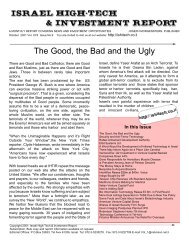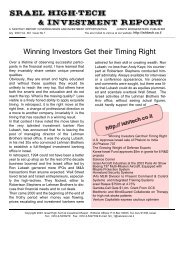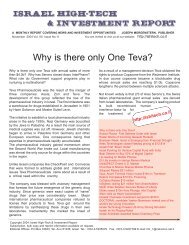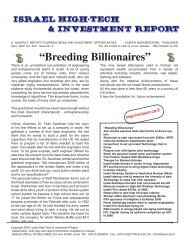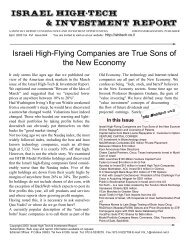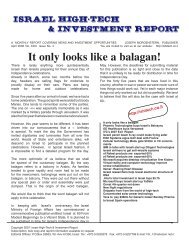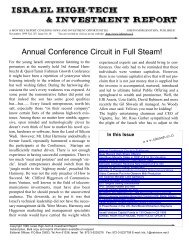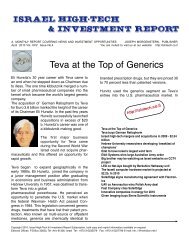Global Linkage - The Israel High Tech & Investment Report
Global Linkage - The Israel High Tech & Investment Report
Global Linkage - The Israel High Tech & Investment Report
You also want an ePaper? Increase the reach of your titles
YUMPU automatically turns print PDFs into web optimized ePapers that Google loves.
eversed, thus raising many questions concerning<br />
our understanding of the mechanisms of aging,”<br />
Prof. Melamed says. “It also presents a novel<br />
approach for rejuvenating the immune system,<br />
and for enhancing the efficacy of vaccination<br />
among the elderly population, an approach that is<br />
now being studied.”<br />
<strong>The</strong> <strong>Tech</strong>nion-<strong>Israel</strong> Institute of <strong>Tech</strong>nology is<br />
<strong>Israel</strong>’s leading science and technology university.<br />
Home to the country’s first winners of the Nobel<br />
Prize in science, it commands a worldwide reputation<br />
for its pioneering work in nanotechnology,<br />
computer science, biotechnology, water-resource<br />
management, materials engineering, aerospace<br />
and medicine. <strong>The</strong> majority of the founders and<br />
managers of <strong>Israel</strong>’s high-tech companies are<br />
alumni. Based in New York City, the American<br />
<strong>Tech</strong>nion Society (ATS) is the leading American<br />
organization supporting higher education in <strong>Israel</strong>,<br />
with offices around the country.<br />
New IAI taxibot to save airlines billions<br />
<strong>The</strong> <strong>Israel</strong> Aerospace Industries Ltd. (IAI) (TASE:<br />
ARSP.B1) passenger jet towing vehicle, capable<br />
of handling even the largest planes in service,<br />
has successful completed a series of trials. <strong>The</strong><br />
taxibot tows planes from passenger gate to the<br />
runway, rendering it unnecessary for the planes to<br />
operate their jet engines.<br />
IAI estimates the cost of the taxibot at $3 million,<br />
and the company expects to sell 1,500 taxibots to<br />
airlines by 2020.<br />
At many airports, the passenger gates are several<br />
miles from the runways, and the drive to the<br />
runway consumes huge quantities of jet fuel. For<br />
example, a Boeing 747 consumes a ton of jet fuel<br />
every 17 minutes.<br />
<strong>The</strong> good news about the taxibot is that a plane’s<br />
crew does not have to use the engines to taxi<br />
from the passenger gate to the end of the runway,<br />
IAI taxibot project manager Ron Brayer<br />
said This is no small thing nowadays. Airlines<br />
will save billions of dollars on fuel. Plane safety<br />
8<br />
March 2011<br />
will improve, because when the engines are<br />
off, the risk of sucking in items on the ground is<br />
reduced. In addition, noise at airports will lessen,<br />
and there will be fewer pollution emissions. In<br />
effect, the plane’s crew will only have to operate<br />
the immense jet engines for less than five minutes<br />
before takeoff.<br />
IAI says that the taxibot can tow the largest passenger<br />
jets now in service, including the Airbus<br />
380 Superjumbo. Tests in recent months at airports<br />
in France and Germany proved that the<br />
taxibot can also tow the Boeing 747.<br />
IAI VP business development Yehoshua Eldar<br />
said that the world’s airlines spend $7-8 billion<br />
a year just on taxiing from the passenger gates<br />
to the runway. This does not even include the<br />
spending of additional hundreds of thousands of<br />
dollars on repairing breakdowns caused by accumulated<br />
engine damage from the sucking of items<br />
into the engines, he said. He predicts that taxibot<br />
sales will begin in 2012.<br />
Sniffer mice have a nose for explosives<br />
Is that a bomb I smell before me?<br />
ONE day, there may be more than X-ray machines<br />
and full-body scanners awaiting you at the airport.<br />
Listen out for the snuffling of sniffer mice as you<br />
pass through security.<br />
<strong>The</strong> critters will not be angling for a snack, though.<br />
<strong>The</strong>y are part of a bomb-detecting unit created by<br />
<strong>Israel</strong>i start-up company BioExplorers, based in<br />
Herzliya, which claims that trained mice can be<br />
better than full-body scanners and intrusive patdowns<br />
at telling a bona fide passenger from a<br />
terrorist carrying explosives.<br />
Eran Lumbroso conceived the mouse-based<br />
explosives detector while serving as a major in<br />
the <strong>Israel</strong>i navy. Along with his brother, Alon, he<br />
founded the company and built a device that looks<br />
much like an average airport metal detector or<br />
full-body scanner.<br />
Along one side of an archway, a detection unit



